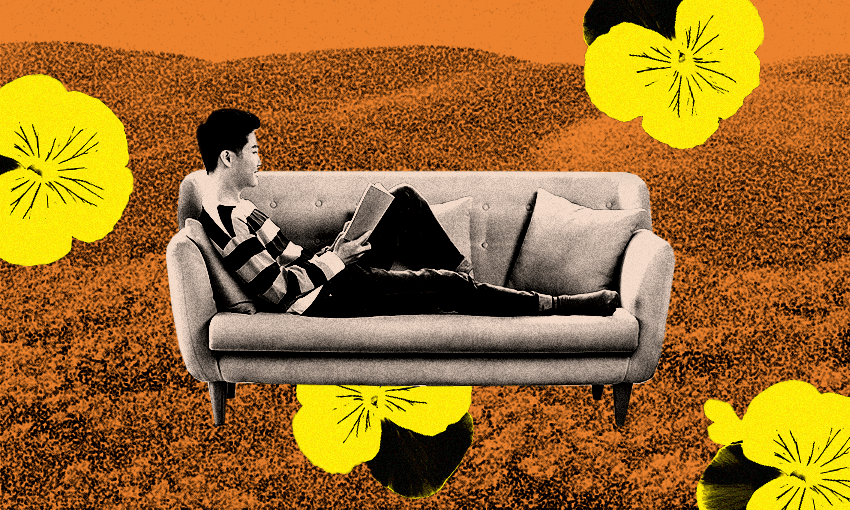There are TV shows, books and movies for discussion, debate and community. And then there are the stories that are just for you.
“Grandma needs to watch her stories” was a phrase I was very familiar with growing up. It meant that every night, at an appointed time, some member of the family would disengage from the day-to-day stresses of the house, in favour of another world. Whether it was actually Grandma was immaterial – it was more the fact that a member of the family needed some time in the home, away from the actual household. They might retreat to Coronation Street, a familiar host on RNZ, or articles from that day’s paper, long after Grandpa (again, not necessarily the literal Grandpa of the house) had defaced, but not necessarily completed, the crossword.
These stories, these “little stories”, wouldn’t get talked about. They wouldn’t be shared with the rest of us. It was understood that they, and the time allocated to them, was solely for “Grandma”.
As I’ve grown up, I realise that we all have our little stories, and we desperately need them. These aren’t the Successions, the Sally Rooneys, or the Marvel franchises of the world; communal hunks of pop culture that we all dive into ravenously, like that week’s pot luck dinner. It’s a midnight snack, a private treat that’s just yours.
In an age where everything we consume has a method by which to share that consumption, to rank it and rate it, to “discourse” it to death, there is value in taking in something that’s just for you. Like cooking whatever your variation of two minute noodles is – this much water, this much extra mayo, or this much whatever – it’s not for anybody else’s pleasure or judgment. It’s just for you. You don’t judge your little story, you don’t hold it up as the best thing that’s ever been made. You hold it up for you.
Shortland Street, currently undergoing a critical renaissance, is the local platonic ideal of a little story. It is a piece of storytelling you can put half an hour into every night, and be rewarded for that investment. If you tune in on a Tuesday, it picks up immediately the moment after it finished on Monday, no exceptions. Each episode literally ends on a facial reaction, with the show’s now signature “dun-dun-dun-dun-dun-dun-dun”.
But it’s not urgent like all those other ubiquitous products. If you miss one episode, you aren’t going to be spoiled by a thousand memes on Twitter, or feel left out of your Slack conversations the next day. If you happen to miss a Tuesday, never fear, there will be a few lines on Wednesday that will catch you up on what you missed. It is designed to be picked up, hugged close to your chest, and put down gently, like a little bunny rabbit. The rabbit might not need the cuddle, won’t resent you for not cuddling it, but it won’t hate it if you pick it up every now and then either. (Disclaimer: I am allergic to rabbits so this might be a poetic interpretation of that species’ wants and needs.)
I have been the Grandma of the house many times throughout my life. When I was a very nerdy teenager, it was every version of Romance of the Three Kingdoms, a 14th-century Chinese novel based on a 2nd-century war that has been adapted into countless TV series, video games and films. Very few other people I know are into this, let alone to the extent that I was. Even fewer people had any interest in hearing about it. During lockdown, it was the Carol Burnett Show, which had taken up residence on Prime Video. Again, not a lot of people were interested in hearing about an American sketch show almost half a century old.
But these fairly obscure cultural artefacts tickled something inside me. When a character pops up in Koei Tecmo’s Dynasty Warriors, a long-running hack-and-slash series adapted from Romance of the Three Kingdoms, it ignited something in my brain. Inside I became the Leonardo DiCaprio in the Once Upon a Time in Hollywood meme, spiritually pointing at the TV when I recognised a major character in the novels, who had been an NPC for eight games suddenly pops up with a complete character design, moveset and narrative that he’s badly needed (hey Cheng Pu!).
Do I think the developers were specifically rewarding my dense knowledge of Romance of the Three Kingdoms? Absolutely not, that would be deranged. But when Carol Burnett trotted out a beloved character, knowing it would please the audience, she did the same thing that Koei Tecmo did there. “You love this, fans. Have some more, for your time.”
If that sounds like gibberish to you, that’s the point. You have versions of these things too, and it will be difficult to explain to others why they matter. They don’t even have to be literal stories. It can be a video game that doesn’t have a narrative, but that takes you away from the real world. It can be a sports tournament, with its vast array of characters, teams and lore. Hell, it can even be a podcast with just a few people yammering on for no rhyme or reason. It doesn’t matter if it’s great, or even good. What matters is that it’s yours.
Currently, my little story is The Legend of Heroes: Trails into Reverie. It is, perhaps, the least immediately accessible game of all time. It is also my favourite game of the year, bar none. It is precisely that lack of accessibility that makes it perfect for this function. Trails into Reverie is the tenth game in a video game series that has been running since 2004. Each game in the series has a ridiculously dense narrative, with as many twists as it has characters, and some of those characters have plot arcs that span all ten games. Each game also takes upwards of 50 hours to beat, and closer to 100 hours if you want to explore every nook and cranny, complete every side quest, talk to every NPC and grab every achievement. If you were to beat every game in the series, it would take close to 800 hours.
So, really, it’s anything but little. But it’s still the perfect ideal of what I’m explaining. Trails into Reverie is not an especially revolutionary game, but it rewards the amount of time and energy you invest in it. If you remember that character who appeared in one game well over a decade ago, well done! The game has paid attention to that character for you, has thrown them a few lines of dialogue, and tickled that part of your brain that wondered what happened to them after that one game, over a decade ago. You pay attention to the game, and the game pays attention in return.
Any of these characters, for example, all of whom are playable and all have dense, rich histories that I could speak for several minutes about, with pinpoint accuracy and better recall than if I was talking about any of my real-life, human, friends:
If someone asks what I’m playing, chances are it is one of the Trails games. It is nearly impossible to explain what happens in any of them, given they all build on each other. Once the words, “Oh, it’s in a sort of fantasy world, but there’s magic, but there’s also technology, also there’s a lot of characters” leave my mouth, I know I’ve lost my audience. I shouldn’t have even tried to describe it. I should’ve just said I play Fortnite, and leave the question-asker with the impression that I am boring, rather than that I’ve spent upwards of 1,000 hours on my life on a story that I cannot share with anybody.
As a writer across a few mediums, having these little stories has become vital for my mental health. Writing requires you to narrativise the world, whether it’s the world outside of you or the world inside. It requires engagement, but it also takes from you: it takes energy, it takes words, it even, paradoxically, takes you away from the very world you need to engage with to tell that story. My little stories don’t do that. They fill me up, with no expectation that I ever have to return the favour.
We all need our little stories. Whether they’re the literal narratives, or the little superstitions we tell ourselves to get by – that if we turn the kettle on after we fill it up life will be OK, or if we step on three cracks in a row on the pavement, our families will live long and healthy lives – we need them. There are stories that we consume and share to find humanity and common ground. Then there are the stories we keep to ourselves. We read them to ourselves, we tell them to ourselves, we live them ourselves, over and over. Those stories make us more human too.



